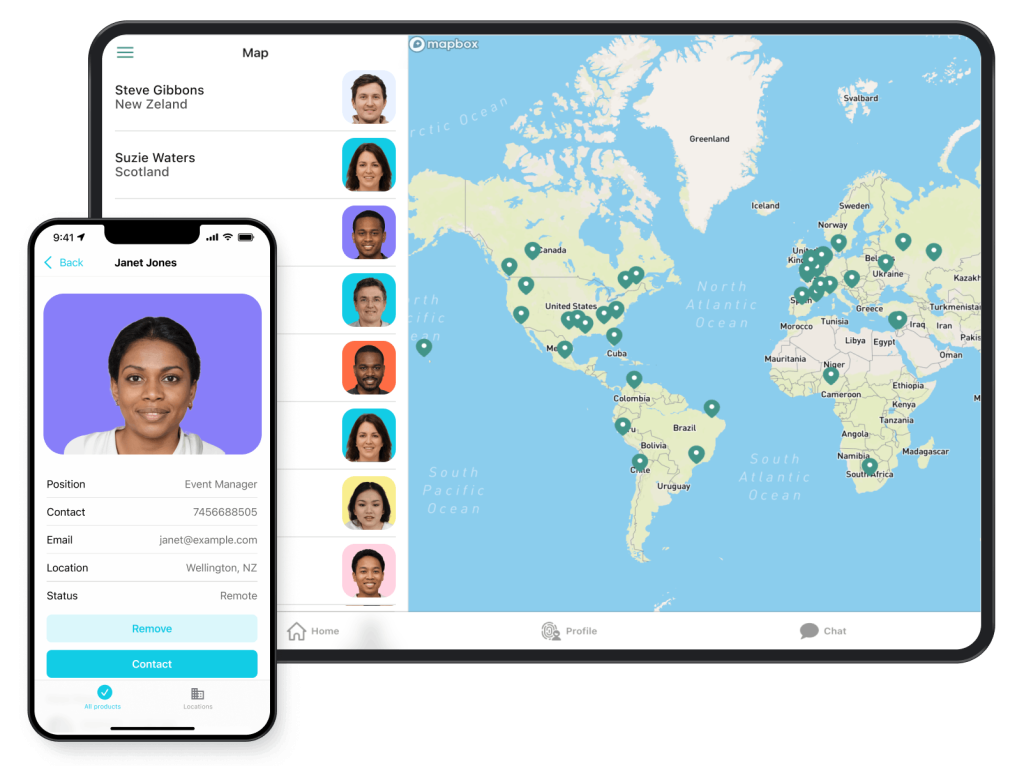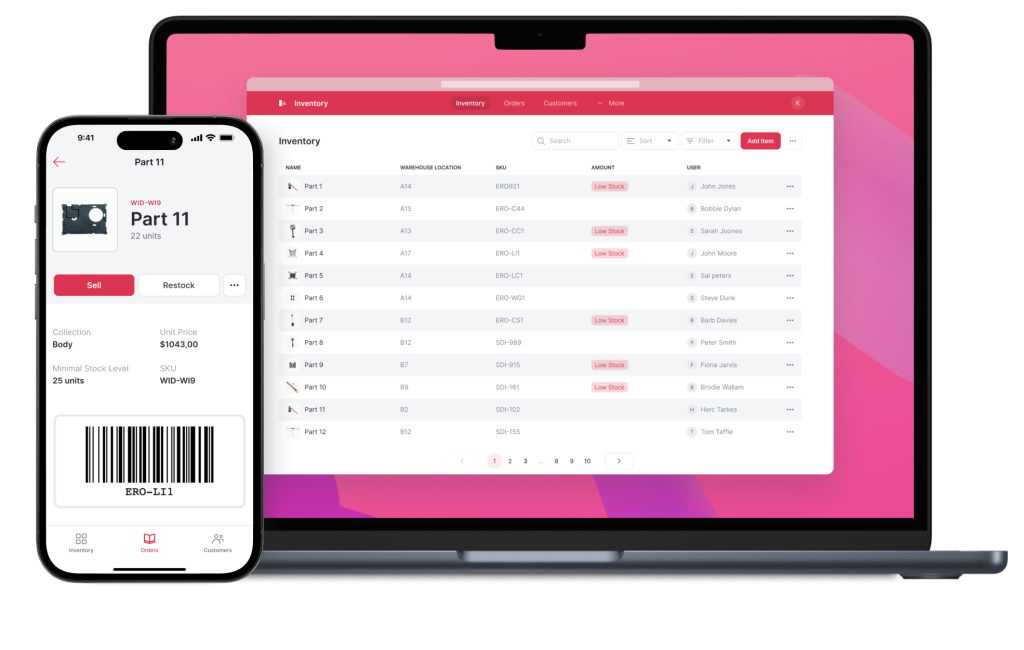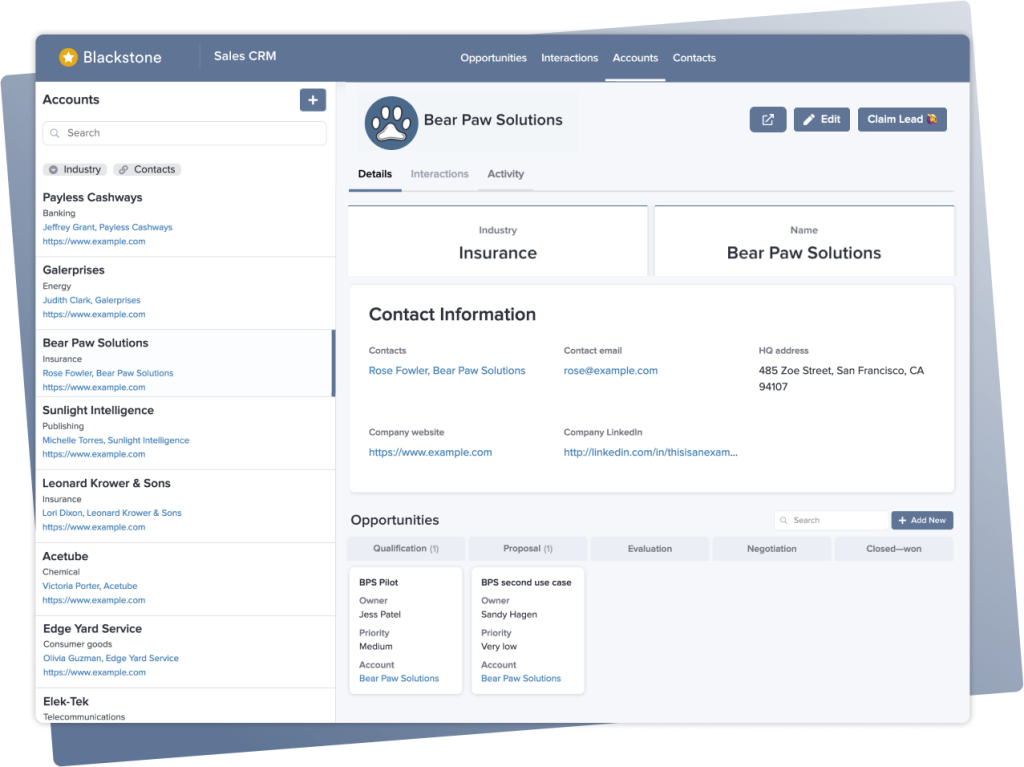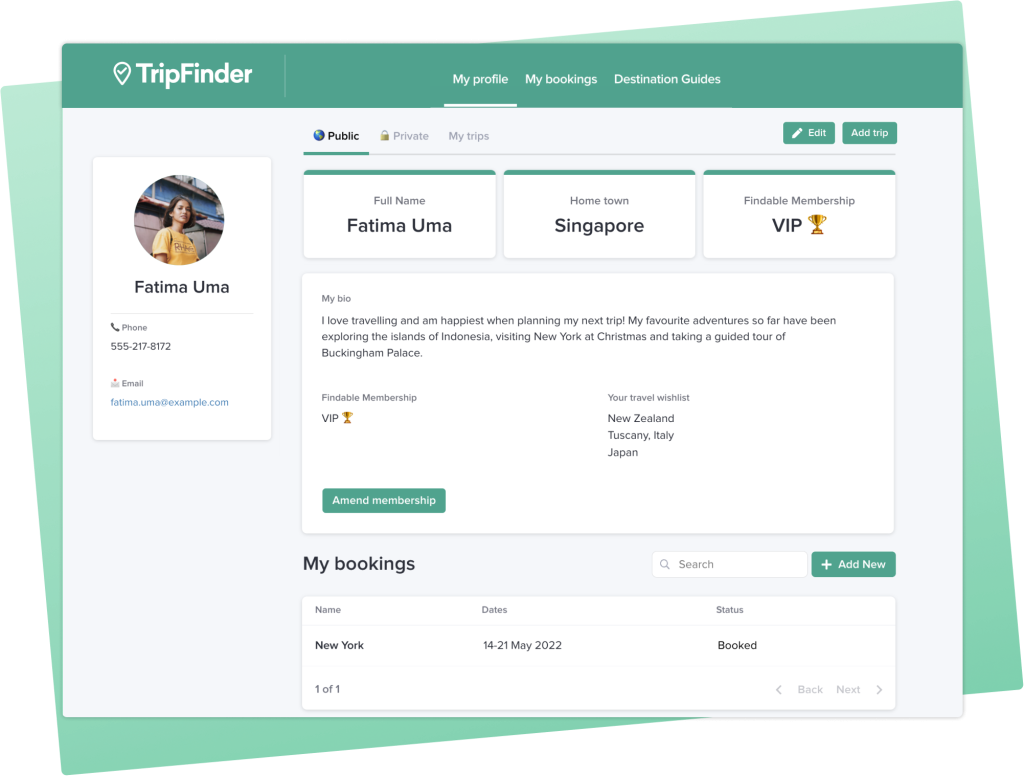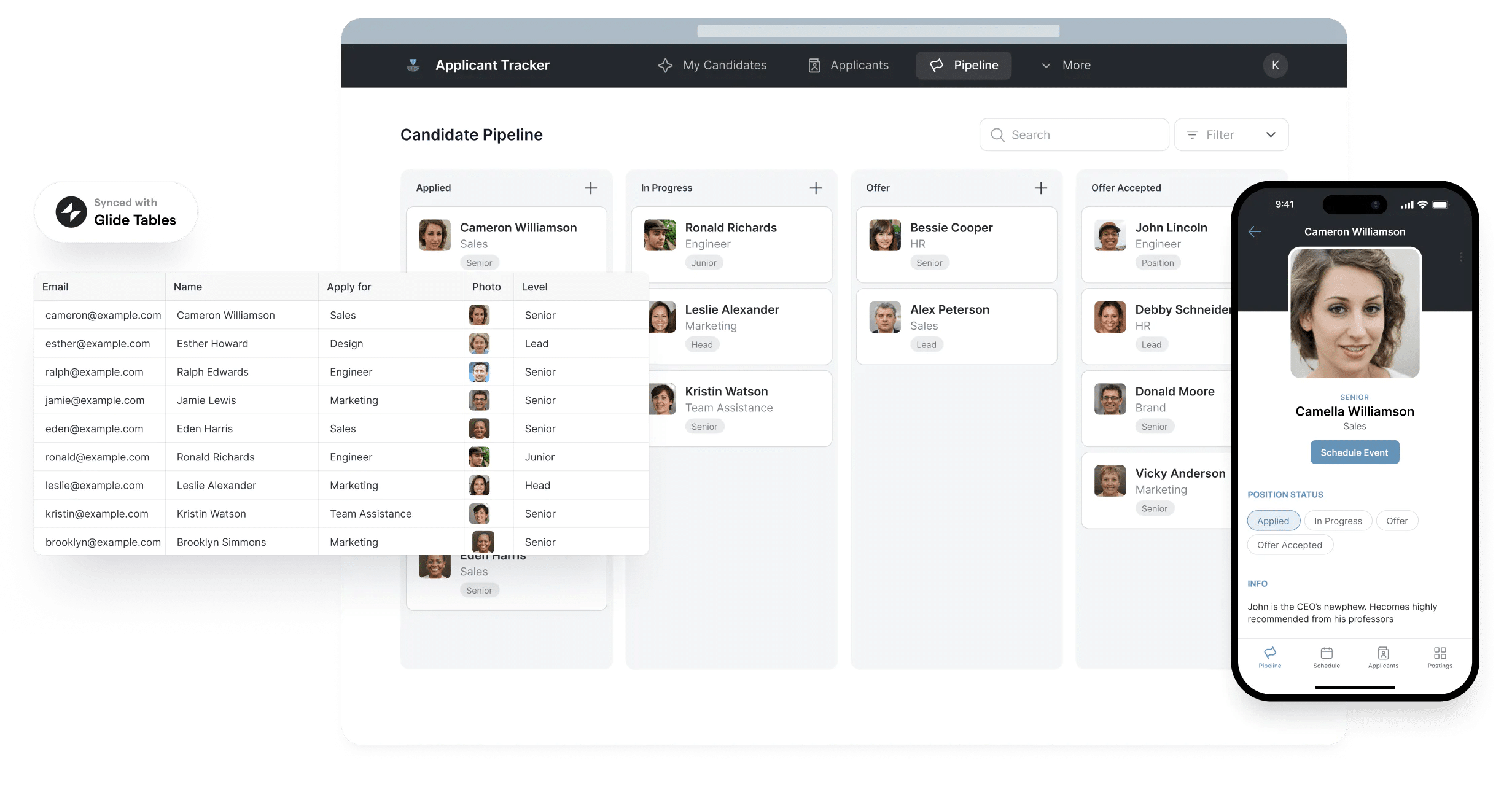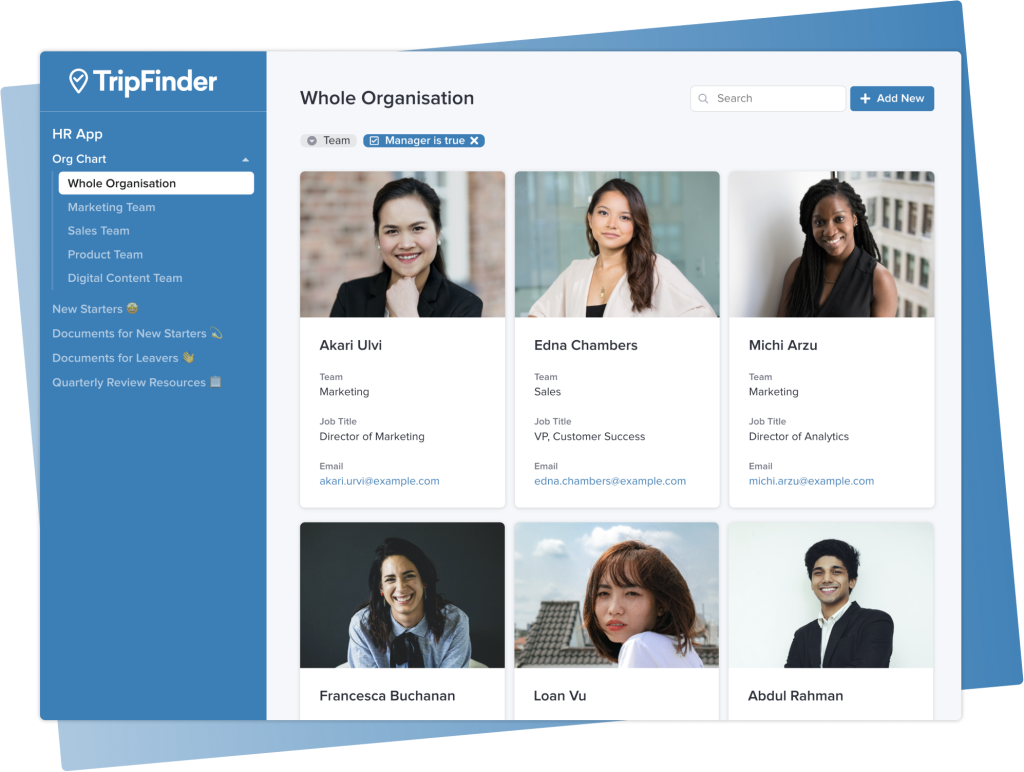Nocode app examples to scale your business using Nocode platforms
Discover nocode app examples for businesses and explore the nocode platforms and examples to create software faster and cheaper.
We don’t know what we don’t know.
As a business founder, this list of nocode app examples will inspire you to set up systems that will help you take your business to the next level.
Businesses often have to work hard to keep up with their competitors. Some competitors are simply bigger with a lot of capital, others have cost or differentiation advantages. While in many cases standard, out-of-the-box software applications (SaaS) work, but some businesses require custom software for their unique business requirements. In most cases, when considering developing custom software, businesses want the custom software to mimic their business processes, which may not be possible with most out-of-the-box software solutions.
This article will:
- explore the benefits of building internal business apps using Nocode platforms,
- provide some ideas for apps that businesses can use to help them succeed,
- list a few nocode or visual development platforms that can help build custom software incredibly faster than traditional software development at a fraction of the cost.
Why create custom software instead of using SaaS?
Software as a Service (SaaS) is a great solution for businesses looking for an easy and cost-effective way to access software. However, for businesses that need more customization and control, creating custom software may be a better option. The need for more customization and better control is derived from the complex and unique processes of the business that out-of-the-box software solutions or SaaS cannot cater to.
Custom software can be tailored to the specific needs of the business, allowing for more flexibility and control. They allow building apps from scratch, often from first principles, by understanding the business requirements in a holistic manner. Additionally, custom software can be designed to integrate with existing business systems and processes and other SaaS solutions. It also makes it easier to manage and maintain.
Custom software can also provide businesses with more scalability and flexibility than SaaS, allowing them to easily add new features and capabilities as their needs evolve. This can be a great benefit for businesses that are growing and looking to expand their operations.
Lastly, costs associated with SaaS creep up as the number of business users increases. Every additional seat costs money, regardless of the use in most cases. Eventually, businesses fall into the trap of signing annual contracts that could cost hundreds of thousands of dollars, if not millions.
Overall, custom software can be a great solution for businesses that need more flexibility, control, and customization than SaaS can provide. By creating custom software, businesses can ensure that their applications are tailored to their specific needs, providing them with a better user experience and improved results, at a much lower cost.
Benefits of using custom software for businesses
Using custom software apps for businesses can provide many benefits, including increased efficiency, better accessibility, lower costs of operations, and improved customer service.
Increased Efficiency
Custom software apps can help streamline business processes and operations. It makes it easier to manage routine tasks such as project management, inventory management, order management, lead management, customer relationship management (CRM), and customer feedback and reviews management. This also frees up time and resources that can be used for more strategic and creative tasks while also providing all information in one place and making it a single source of truth.
Accessibility
With custom software apps, employees can access the same data and information from any device, regardless of their location, allowing for better collaboration and communication within the organization. Having all information in one place is a great time-saver and an absolute game changer when it reduces dependencies on other team members.
Lower Cost of Operations
Using custom software apps can reduce the cost of operations by eliminating the need to purchase separate software, as well as the cost of maintaining and updating them. The biggest saving is from paying per seat for access to software applications and saving yourself from signing annual contracts that cost millions of dollars. Additionally, custom software apps can automate many of the manual processes required to run a business, reducing the need for additional personnel. Traditionally, you would be required to purchase additional software to do this or complete these tasks manually.
Improved Customer Service
Custom software apps can help businesses keep track of customer data and preferences, allowing them to provide better and faster customer service. The biggest advantage is having a single source of truth about all customer information. Additionally, businesses can use apps to provide customers with personalized offers and discounts, increasing customer loyalty and retention.
By adopting a custom software development approach, businesses can grow, become more efficient, become more sustainable by reducing their operating costs, and better serve their customers.
Here are multiple examples of apps that can be built with Glide Apps.
Nocode app examples to improve business operations
Project Management (PM)
Project management apps help track and manage ongoing projects.
These apps can be used for resource management and task management:
- to create and assign tasks to team members,
- track progress,
- manage timelines,
- store and share project-related documents.
By using a project management app, businesses can ensure that projects run smoothly and efficiently, resulting in better results and improved customer satisfaction.
Some out-of-the-box software solutions for project management are Asana, Basecamp, NiftyPM, and Hive.
One could also customize Monday and Clickup to build a project management system.
Here are a few examples of project management apps built using nocode platforms:
- a project management app built using Noloco
- a content production app built using Noloco
- a product planning app built using Noloco
Inventory Management
Inventory management involves tracking and managing stock levels, orders, and deliveries to ensure that products are in stock and available when needed. By keeping a close eye on inventory levels, businesses can avoid costly stock-outs and ensure that they have the right amount of products on hand to meet customer demand.
Inventory management systems are usually provided by enterprise service providers and come at very high price points. These systems are usually perfect for custom software development either using visual development with Glide, Noloco, Stacker, or Softr or using custom software development with the help of software development agencies.
Here are a few examples of inventory management apps built using nocode platforms:
Order Management
Order management systems are used to track and manage customer orders and ensure that they are fulfilled accurately and on time. These apps help track the status of orders, manage customer communication during the delivery phase of the order, and facilitate logistics support for order delivery. By using an order management app, businesses can ensure that their customers receive their orders quickly and without any issues.
Like inventory management, order management systems are excellent candidates to build using nocode platforms like Glide, Noloco, or Stacker.
If you’re looking for an out-of-the-box solution, Zoho Inventory is an application that serves both inventory and order management.
Here are a few examples of order and delivery management apps built using nocode platforms:
- an order management app developed in Glide Apps [FREE]
- a delivery tracker app developed using Glide Apps [FREE]
Vendor Management
Vendor management systems help businesses manage their vendor relationships and operations. These systems allow businesses to store and manage vendor data, including contact information, contract details, and payment terms. Additionally, vendor management systems can be used to track vendor performance, allowing businesses to identify areas for improvement and quickly respond to any issues that may arise. By using a vendor management system, businesses can ensure that their vendor relationships are running smoothly and efficiently.
There are very few vendor management systems in the market. As a result, an application for vendor management can be easily built using nocode platforms like Glide, Noloco, or Stacker.
Here’s an example of a vendor management app built using Noloco.
Time Tracking System
Time tracking systems allow businesses to easily track employee hours and attendance, allowing them to quickly identify and address any issues related to capacity utilization, over/under budgeting, etc. that may arise. Additionally, time-tracking systems can be used to create reports, analyze employee performance, and identify areas for improvement. By using a time tracking system, businesses can ensure that their employees are working efficiently and productively and that their operations are running smoothly.
For simple time-tracking on projects, there are SaaS applications like Hubstaff, Toggl Track, Time Doctor, Harvest, etc. and Asana provides it as an additional feature.
Usually, time-tracking software requires pairing with security and access hardware. So, if you’re looking for simple time-tracking software, consider using Glide, Noloco, or Stacker, else speak to custom software development agencies or security systems providers.
Here’s an example of a time tracker app built using Glide Apps.
Nocode app examples for customers of a business
Customer Relationship Management (CRM)
A Customer Relationship Management (CRM) system is a powerful tool for businesses to manage customer relationships and customer data. It allows businesses to store and access customer data such as contact and purchase information, preferences, and feedback. This information can then be used to provide personalized offers and discounts, increase customer loyalty, and improve customer service.
Additionally, CRM systems can be used to track customer interactions, allowing businesses to identify trends, spot opportunities, and quickly respond to customer enquiries. By using a CRM system, businesses can stay connected to their customers and ensure that their relationships are mutually beneficial.
Lead management systems are a subset of CRMs, and are used for tracking and managing leads. This allows businesses to track the progress of leads from initial contact to purchase, allowing them to identify the most successful marketing strategies, target the right leads, and close more deals. Lead management systems also allow businesses to track customer journeys and preferences, allowing them to send personalized offers and discounts to their customers. This helps build customer loyalty and increase sales.
Some standard SaaS solutions for CRMs and lead management are Pipedrive, Hubspot, Close, Zoho, FreshSales, and GoHighLevel. Here’s a guide to help you select the right CRM platform for your business. If you’re looking for help with Pipedrive, do not hesitate to reach out to me. This article covers a brief review of Pipedrive and showcases a few Pipedrive alternatives.
Here are a few examples of CRM apps built using nocode platforms:
Customer portal (also called client portal)
A customer portal app provides customers with an easy and convenient way to access information and interact with the business. This app can be used to store customer data, such as contact and order/purchase information, and provide customers with an easy way to view and manage their accounts. Additionally, customer portals can be used to provide customers with access to services such as online ticketing, online payment, and online support. By providing customers with an easy and convenient way to interact with the business, customer portals can help businesses improve customer satisfaction and loyalty.
This category of the segment is perfect for development using nocode or visual software development.
Here are a few examples of customer portal apps built with nocode platforms:
- a customer success management app built using Noloco
- a membership management app built using Glide Apps
- a customer portal app built using Glide Apps
Customer feedback & reviews
Customer feedback and reviews management systems help businesses monitor customer satisfaction and identify areas for improvement. These systems allow businesses to collect feedback from customers in real-time, allowing them to quickly address any issues or problems that may arise. Additionally, businesses can use these systems to analyze customer feedback, identify trends, and gain insights into customer behavior. By using customer feedback and reviews management systems, businesses can ensure that they are providing the best possible customer experience and improving their products and services.
This category of software is another excellent candidate for developing in nocode platforms like Glide, Noloco, or Stacker.
Some SaaS solutions for this category are Testimonial, Stamped, Reviews, and Proof.
Customer Support (CS)
A customer support app can be a great tool for small businesses looking to improve their customer service. These apps allow businesses to track and manage customer inquiries, complaints, and feedback in one central location. This makes it easy for businesses to respond quickly and accurately to customer inquiries and complaints, as well as provide customers with helpful and relevant information.
Additionally, customer support apps can provide businesses with insights into customer behavior, allowing them to identify areas for improvement and ensure that they are providing the best possible customer service. By using a customer support app, businesses can ensure that their customers are being taken care of and that their customer service is top-notch.
These tools often provide a ticketing system to their customers and are essentially social listening tools to allow businesses to hear from customers from all social platforms. The social listening tools aspect makes it difficult to develop this kind of software using Nocode platforms.
If you’re looking for SaaS solutions for customer support, check out Gorgias, FreshDesk, Help Scout, Trengo, and Zoko.
Nocode app examples for Human Resources
Human Resources Management Systems (HRMS)
Human resources management systems are a valuable tool for small businesses to streamline their HR operations. These systems allow businesses to track employee data such as contact information, job history, qualifications and skills, salaries, and performance reviews.
Additionally, human resources management systems can be used to create and manage employee records, manage benefits and payroll, and track employee attendance and leave. By using a human resources management system, businesses can ensure that their HR operations are efficient and effective. Human resources management is a category in itself and encompasses many nifty internal tools and tool ideas. For instance, employee attendance and leave management can be individual apps in their own right. So can reimbursement approval management.
Some out-of-the-box SaaS solutions for this category are Deel, Remote, Bambee, Papaya Global, and BreezyHR.
Here are a few examples of apps built using nocode platforms in this category:
- an employee development resources app built using Noloco
- an employee onboarding app built using Noloco
- an employee directory app built using Glide [FREE]
Applicant Tracking System (ATS)
Recruitment management systems or Applicant Tracking Systems help businesses streamline their recruitment process. These systems allow businesses to post job openings, track applicants, manage the hiring process, and onboard new employees. By using a recruitment management system, businesses can ensure that they are finding the right candidates quickly and efficiently and that they are onboarding and training new employees smoothly.
Additionally, recruitment management systems can provide businesses with insights into the recruitment process, allowing them to identify areas for improvement in a variety of aspects of recruitment.
While there are many off-the-shelf ATS applications available in the market, here are a few examples of apps built using nocode platforms in this category:
- an applicant tracker built using Glide Apps [FREE]
- an applicant tracking system built using Noloco
- a talent-matching app built using Noloco
Learning Management System (LMS)
A learning management system (LMS) helps businesses manage and track the learning and development of their employees. This system allows businesses to store and manage training materials and courses, track employee progress, and provide feedback to employees.
Additionally, an LMS can be used to assign tasks, track employee performance, and ensure that employees have the necessary skills and knowledge to perform their jobs. By using an LMS, businesses can ensure that their employees are learning and developing the skills needed to be successful in their roles.
There are many SaaS solutions for LMS such as Thinkific, LearnDash, Tovuti, and TalentLMS.
Here are a few examples of LMS apps built using nocode platforms:
Nocode app examples for Administrative use
Office Supplies Management
Office Supplies Management systems enable businesses to effectively and efficiently manage the ordering, delivery, and usage of office supplies such as stationary, food, pantry items, furniture, hardware, and equipment. Businesses can use these systems to track and manage their inventory, monitor the supply of materials and supplies, and ensure that orders are placed on time. By utilizing an Office Supplies Management system, businesses can ensure that they have the materials and supplies they need to run their operations smoothly.
Here are a few examples of supplies management apps built using nocode platforms:
Employee directory
An employee directory allows businesses to organize their workforce and stay connected with their employees. It allows businesses to store and access employee data such as contact information, job titles, and department information. This information can then be used to quickly find contact information for employees, search for employee information, and keep track of employee locations.
Additionally, an employee directory can be used to identify potential candidates for positions and provide an overview of the company’s organizational structure. By using an employee directory, businesses can ensure that they are staying connected with their employees and easily find the information they need.
Here are a few examples of employee directory apps built using nocode platforms:
Nocode app examples for Marketing
Content Management
Content management systems help businesses create and manage content for their website, blog, and social media channels. These systems provide businesses with a platform to create, store, and manage content, ensuring that it is up-to-date and relevant to their customers.
Additionally, content management systems provide businesses with analytics and insights into their content, allowing them to identify trends, spot opportunities, and measure the success of their content. By using a content management system, businesses can ensure that their content is engaging, relevant, and effective.
Here are a few examples of employee directory apps built using nocode platforms:
Website Development
Creating a website for your business can be a daunting task. With so many different web technologies and platforms out there, it can seem overwhelming to figure out which one is right for your business. But it doesn’t have to be. Website builders are a great way for businesses to quickly and easily create a website without having to learn complex coding languages.
Website builders are user-friendly, customizable, and provide a wide range of features and functionalities. They allow businesses to create a professional website with minimal effort, and often include drag-and-drop interfaces, built-in templates, and other features to make the website-building process easier. Additionally, website builders are often significantly cheaper than hiring a web developer, making them a great choice for businesses looking to get a website up and running quickly and on a budget.
Some great choices for a website builder are Weblow, Versoly, Unicorn Platform, Dorik, Carrd, and Framer. Each of these platforms has built its own marketing website using its website builder. So we don’t need samples!
How to make custom software for business?
No-code platforms are quickly becoming the go-to solution for small businesses that need to create custom software applications quickly and cost-effectively. These platforms allow users to create applications without having to write code, meaning that businesses can get their applications up and running quickly. By using a no-code platform, businesses can reduce the time and money spent on custom software development, allowing them to focus on other aspects of their operations. Additionally, no-code platforms provide businesses with a wealth of features and tools that can be used to customize their applications and make them unique to their business and customers.
Here are four nocode platforms to help you build custom software for your business:
- Glide Apps has its own native tables and connects with Google Sheets, Airtable, Excel, MySQL, and BigQuery.
- StackerHQ offers native tables and connects with Airtable, Google Sheets, and a host of 3rd party apps via FiveTran.
- Noloco too offers native tables and connects with Airtable, Google Sheets, MySQL, PostgreSQL.
- Softr connects with Airtable, Google Sheets, Hubspot and SmartSuite.
All these platforms help create mobile responsive apps, which means that the apps you create will work on mobile as well and you won’t have to create separate mobile apps.
These platforms offer drag-and-drop functionality to build apps and offer great design out of the box. As such, you don’t have to invest separately in design development.
These platforms make for an excellent choice to develop custom software for small businesses that help with small business management immensely.
As such, small business owners and even medium and large business owners should explore these platforms to provide their businesses additional leverage to grow.
Summary
This article outlines custom software ideas for businesses and startups, from customer support and HRM solutions to office supplies management and website development. Examples of custom software apps that can be built using no-code platforms like Glide Apps, StackerHQ, Noloco, and Softr are provided. These platforms enable businesses to create custom software quickly and cost-effectively, freeing up resources for other operations.

